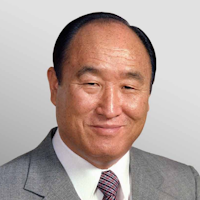In the Fullest Gratitude
Topic: Gratitude
A wise person thinks like this: “I have only a short time to live. Within this time I must prepare myself for eternity. The way I live in the next two years will be the model for my eternal life.” Then explode your sense of love. Love God, and love another person as God. For an entire day, 24 hours, pour out your entire energy for someone. If you love a person like this, even though you may die early, you will have made the highest accomplishment in all eternity. Then when God gives you more time to live, your response will be immense gratitude. Push yourself to live more fully. The person who expects death and then is given life dwells in the fullest gratitude.
Sun Myung Moon (born January 6, 1920, in Jeongju, in what is now North Korea – died September 3, 2012, in Gapyeong, South Korea) was a Korean religious leader, entrepreneur, and founder of the Unification movement. Raised in a rural Confucian-Christian household during the Japanese occupation of Korea, Moon’s early life was shaped by hardship, devotion, and a strong sense of spiritual calling. As a teenager, he experienced a profound vision in which he believed Jesus commissioned him to complete the work of restoring humanity to unity with God. This revelation became the foundation of his lifelong ministry, devoted to the ideal of universal peace and the healing of the relationship between the divine and human families.
In 1954, after enduring persecution and periods of imprisonment under both Japanese and communist authorities, Moon founded the Holy Spirit Association for the Unification of World Christianity in Seoul. His teachings—later presented systematically in the Exposition of the Divine Principle—offered a reinterpretation of Christian theology emphasizing God’s parental love, human responsibility, and the sanctity of marriage and family. Central to his vision was the belief that love is the creative force of the universe and that humanity’s purpose is to build a world reflecting the oneness of God’s heart. Through international missions, interfaith dialogue, and mass wedding ceremonies symbolizing global reconciliation, Moon sought to transcend divisions of race, religion, and nationality.
Beyond his religious work, Moon established numerous organizations in education, media, culture, and humanitarian service, aiming to foster dialogue, moral renewal, and peace. He and his wife, Hak Ja Han Moon, were regarded by followers as the “True Parents,” embodying the ideal of restored unity between men and women, heaven and earth. While his movement inspired both devoted commitment and significant controversy, Moon’s influence on global religion, culture, and peace initiatives remains substantial. His life reflected an unwavering pursuit of the vision of one human family under God—a vision he advanced with conviction, discipline, and enduring faith in the transformative power of divine love.
How To Gain Spiritual Help
Moon, Sun Myung. How To Gain Spiritual Help. HSA-UWC Publications, 2008. [Reverend Sun Myung Moon, How To Gain Spiritual Help, Nov. 27, 1978].

Sun Myung Moon
Theme: Gratefulness


Sun Myung Moon
Gratitude and Prison
Senator Orrin Hatch
Heungnam Labor Camp
Resources
Related Quotes
Copyright © 2017 – 2026 LuminaryQuotes.com About Us